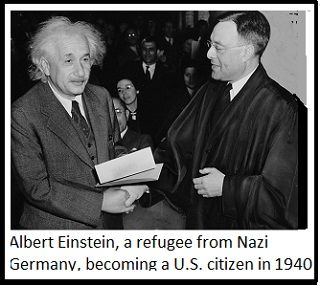Do You Know This Immigration Vocabulary?
You need immigration vocabulary to study American history. As President Obama points out in the speech below, all Americans (at least after the native Americans) originally came from someplace else.

The growth of the U.S. and of the development of a distinctly ‘American’ culture is a direct result of immigration.
I taught Citizenship as a part of adult ESL classes in southern California for years.
This twenty minute speech by President Obama is a good summary of the role immigrants have played in American history.
It's also an eloquent plea for tolerance and active participation in democracy.
It’s worth reading or listening to for that reason alone.
It also provides valuable practice with some academic vocabulary. (See the matching exercise near the bottom of the page, too.)
President Obama’s Citizenship Ceremony Speech
President Obama gave this speech at a naturalization ceremony. (That's when immigrants to the U.S. became citizens.) It was held at the National Archives, which house our founding documents. The Declaration of Independence, the Constitution, and the Bill of Rights are there.
Ar the ceremony, the immigrants took the oath of allegiance and became citizens. Then Obama spoke to them about how their experiences fit into the story of American history.
He talked about Ellis Island (in New York Harbor), and Angel Island (in San Francisco Bay). Those were the main places where the U.S. government processed new immigrants in the late 19th and early 20th centuries.
His message is important because, as he said “It’s about the meaning of America and what kind of country do we want to be.”
He also told them, “Being a citizen is hard.” He added, “There’s no respite (relief) from our ideals. All of us are called to live up to our expectations for ourselves -- not just when it’s convenient, but when it’s inconvenient. When it’s tough. When we’re afraid...”*
He quoted former President Kennedy on how much democracy requires of its citizens. He pointed out “Our system of self-government depends on ordinary citizens doing the hard, frustrating but always essential work of citizenship -- of being informed... Of speaking out when something is not right. Of helping fellow citizens when they need a hand...
And that work gives purpose to every generation. It belongs to me. It belongs to the judge. It belongs to you. It belongs to you, all of us, as citizens. To follow our laws, yes, but also to engage with your communities and to speak up for what you believe in. And to vote -- to not only exercise the rights that are now yours, but to stand up for the rights of others...
You will not and should not forget your history and your past. That adds to the richness of American life. But you are now American. You’ve got obligations as citizens. And I’m absolutely confident you will meet them. You’ll set a good example for all of us, because you know how precious this thing is...”
* Three dots like this: ... inside a quote mean a part of the quote has been omitted (left out)—often to save space. Do listen to the whole speech to get all the ideas he shared. It's great practice with citizenship and immigration vocabulary too.
A few explanations of words before you watch the video:
Betrayal means being disloyal to your friends or your country. (Often it means putting them in danger by giving secrets to an enemy. In this case, Obama means violating basic American values.)
A generation is a group of people living at about the same time. We talk about our grandparents’ generation, or our parents’, or our children’s. A generation covers a period of about 20 years.
Refugees are people who have had to leave their own country because of threats of violence against them. Often they're threatened because of their religion or ethnic group.
After watching the speech, match citizenship and immigration vocabulary he used to the words’ meanings. (If you would rather read his speech, the written transcript is here.)
Citizenship and Immigration Vocabulary Matching
Match the words on the right with the definitions on the left. The first has been done as an example.
For more about immigration in American history, see this interactive chart. (It links at the bottom to several maps on immigration.) You can also read this story about it and practice irregular past tense verbs.
If you are studying for the U.S. Citizenship test, see American Citizenship Test Questions.
There's more on current immigration and refugee issues in newsletter #110. See the Back Issues page.
Home> Vocabulary Games> Citizenship and Immigration Vocabulary.
Didn't find what you
needed? Explain what you want in the search box below.
(For example, cognates, past tense practice, or 'get along with.') Click to see the related pages on EnglishHints.
| site search by freefind | advanced |





